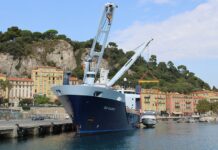
Dockers at Australia’s Victoria International Container Terminal (VICT) are set to strike from 16:00 hours to 20:00 (Melbourne local time) on 16 February following a ballot which was supported by all the dock workers in the union.
[s2If is_user_logged_in()]Union negotiations into a new dock agreement that addresses dockers’ concerns about long hours and under-staffing at the automated terminal have seen the staff reject two agreements put forward by management by a margin of over 90% according to the Maritime Union of Australia (MUA).
MUA Western Australia Branch Secretary, Will Tracey, who is co-ordinating the negotiations on behalf of the VICT workforce, said the dispute centred around the unacceptable working conditions at the terminal.
He added, “VICT are under the mistaken belief that just because they’re running an automated container terminal, they can treat workers like robots.”
Tracey said that unlike the machinery, the dockers, who operate the staff, are not machines and they need their downtime.
The MUA reports that dockers are being asked to work “huge amounts of overtime — in many cases between 50 and 70 additional 12 hour shifts during the last year — due to the company’s refusal to employ an appropriate number of people.”
Additionally, the union claims that staff are being pressurised by the company to miss breaks making it difficult for them to have a meal or use toilet facilities during a 12-hour shift.
VICT is under the control of Philippine billionaire Enrique Razon, and he has reportedly refused to engage with the issues raised by the union and the workers, “with management going so far as to walk out of negotiations last week, further aggravating tensions,” said the MUA.
Meanwhile, carrier representatives, Shipping Australia Limited (SAL) said that the union agenda was to, “Force Australia’s first fully automated container terminal to comply with ‘industry standards’ by adopting the incompatible hours, manning and overtime conditions that govern the manually operated terminals around Australia.”
SAL claims that the adoption of such practices would “see the terminal saddled with inappropriate working arrangements, its efficiencies seriously compromised, and its potential to achieve profitability put at risk”.
According to the owners, MUA demands include pay increases of between 5.8 and 11% for all staff, with penalty rates rising from 50% to 100%. In addition, the union wants a paid week off every 10 weeks, with reduced hours in the ninth week.
The effects of these demands would be to reduce the staffing levels by 11.4%, “The MUA roster would require an additional panel of employees to make the operation viable, requiring a 25% increase in labour numbers, 11.4% fewer hours for everyone, plus a wage increase of up to 20%,” claimed SAL.
Terminal operations are currently conducted by 12-hour shift patterns with a rota that allows four days working followed by four days rest, meaning that staff work 15 days per month.
Nick Savvides
Managing Editor
[/s2If]
[s2If !is_user_logged_in()]Please login or register to read the rest of the story[/s2If]





